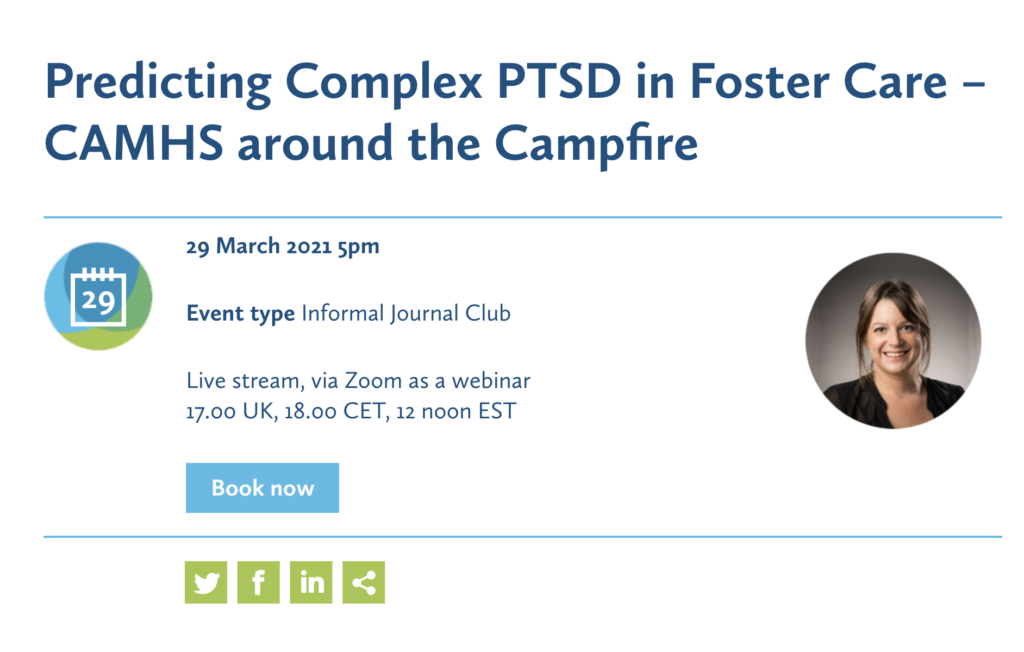
Many young people in care suffer from PTSD symptoms and have often experienced ongoing, repeated interpersonal trauma. The new diagnostic category of “Complex PTSD”, which can be used when traumas such as maltreatment have been ongoing, includes some additional features.
Whilst effective psychological models and treatment interventions have been developed for adults and children who have suffered trauma, little research has been carried out with young people in care.
According to the authors (Hiller et al, 2021), psychological models identify three cognitive processes theorised to underlie PTSD symptoms:
- Maladaptive appraisals, in which individuals experience highly negative thoughts about their trauma (e.g. “I’ll never get over what happened”, “I can’t trust anyone”)
- Trauma memory qualities, in which individuals experience flashbacks and sensory feelings of threat
- Cognitive coping strategies, in which individuals suppress, avoid or ruminate on thoughts and experiences.
The purpose of this study was to investigate the applicability of these models of PTSD and explore whether PTSD and Complex PTSD share the same drivers.

Psychological models theorise that maladaptive appraisals, trauma memory qualities and cognitive coping strategies underlie PTSD symptoms.
Methods
This was a cohort study involving young people in care, aged 10-18 (Hiller et al, 2021). Participants and their carers were provided with questionnaire packs at baseline and after 12 months follow-up.
Outcome measures
The researchers measured young peoples’:
- Trauma and maltreatment history (using the Child and Adolescent Trauma Screen (CATS) and social workers’ reports on physical abuse, sexual abuse, emotional abuse and domestic violence, consolidated into “present” or “absent”).
- PTSD Symptoms (using the CATS DSM-5 PTSD scale) and Complex PTSD symptoms (using a newly-developed 12-item Child Complex PTSD Checklist)
- Cognitive processes
- Maladaptive appraisals (using the Child Posttraumatic Cognitions Inventory)
- Coping (using the Child Post-trauma Coping Questionnaire)
- Trauma memory quality (using the Trauma Memory Quality Questionnaire)
They then used linear regression analysis to examine how the cognitive processes were related to PTSD symptoms and complex features.
Results
120 young people in care aged 10-18 were recruited. 86% were in foster care, 9% in kinship care and 5% in residential care. Nearly a third of young people had probable PTSD according to either their report or their carers’ report. There was no significant change in symptoms over the twelve months of follow-up.
PTSD and complex PTSD symptom severity were strongly correlated with each other.
Cognitive processes were correlated with PTSD symptoms. Broadly, maladaptive appraisals accounted for the largest proportion of PTSD symptoms.
It was notable that trauma severity was not associated with symptom severity.

Cognitive processes were correlated with PTSD symptoms. Broadly, maladaptive appraisals accounted for the largest proportion of PTSD symptoms.
Strengths and limitations
This was an observational study with inherent limitations around the directionality of causation. There’s also a risk of “false positives” when you look for associations between lots of data points. With only 120 participants, the risk is higher.
About half of those invited to participate declined, the great majority because they could not be contacted or were too busy. Since avoidance is a symptom of PTSD, it is possible that those who did not take part were more likely to have PTSD.
20% of participants were not followed up. Although the missing data was imputed, this may introduce attrition bias.
Some further discussion points re: potential ascertainment bias:
- Young people reported on both their PTSD symptoms and the mechanisms being examined (i.e. their cognitive biases) and this could introduce single informant biases, but it was a strength that both parents and young people reported on symptoms. The fact that these reports were not well correlated underlines the importance of asking both young people and parents about PTSD symptoms.
- The newly developed instruments (e.g. for complex PTSD) may require further validation in this population group
For these reasons it would be helpful to replicate this evidence in other groups.
Conclusions
This evidence is consistent with the proposition that established cognitive models are applicable to young people in care with experience of complex trauma.
It is striking that the cognitive processes were more strongly correlated with symptom severity than was the severity of the trauma itself.
A focus on maladaptive appraisals may be beneficial in improving CBT interventions aimed at helping young people in care who suffer from symptoms of trauma.

A focus on maladaptive appraisals may be beneficial in improving CBT interventions aimed at helping young people in care who suffer from symptoms of trauma.
#CAMHScampfire
Join us around the campfire to discuss this paper
The elves are organising an online journal club to discuss this paper with first author Dr. Rachel Hiller, an independent expert (Prof Helen Minnis), a young person and our good friends at ACAMH (the Association of Child and Adolescent Mental Health). We will discuss the research and its implications. The webinar will be facilitated by André Tomlin (@Mental_Elf).
The focus will be on critical appraisal of the research and implications for practice. Primarily targeted at CAMHS practitioners, and researchers, ‘CAMHS around the Campfire’ will be publicly accessible, free to attend, and relevant to a wider audience.
It’s taking place at 5-6pm GMT on Monday 29th March and you can sign up for free on the ACAMH website or follow the conversation at #CAMHScampfire. See you there!

Sign up now to our FREE #CAMHScampfire event!
Links
Primary paper
Hiller RM, Meiser-Stedman R, Elliott E, Banting R, Halligan SL. A longitudinal study of cognitive predictors of (complex) post-traumatic stress in young people in out-of-home care. J Child Psychol Psychiatry. 2021 Jan;62(1):48-57. doi: 10.1111/jcpp.13232. Epub 2020 Mar 20. PMID: 32196661.
Photo credits
- Photo by Awab Husameldin on Unsplash
- Photo by Tamanna Rumee on Unsplash
- Photo by Wonderlane on Unsplash
